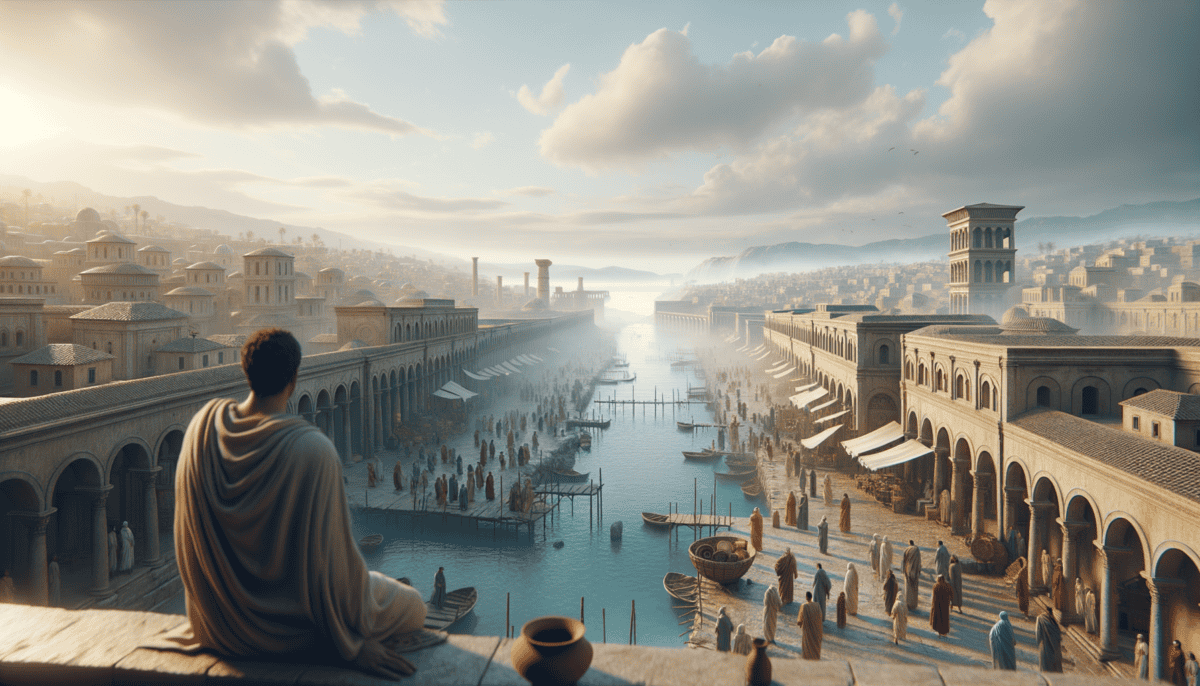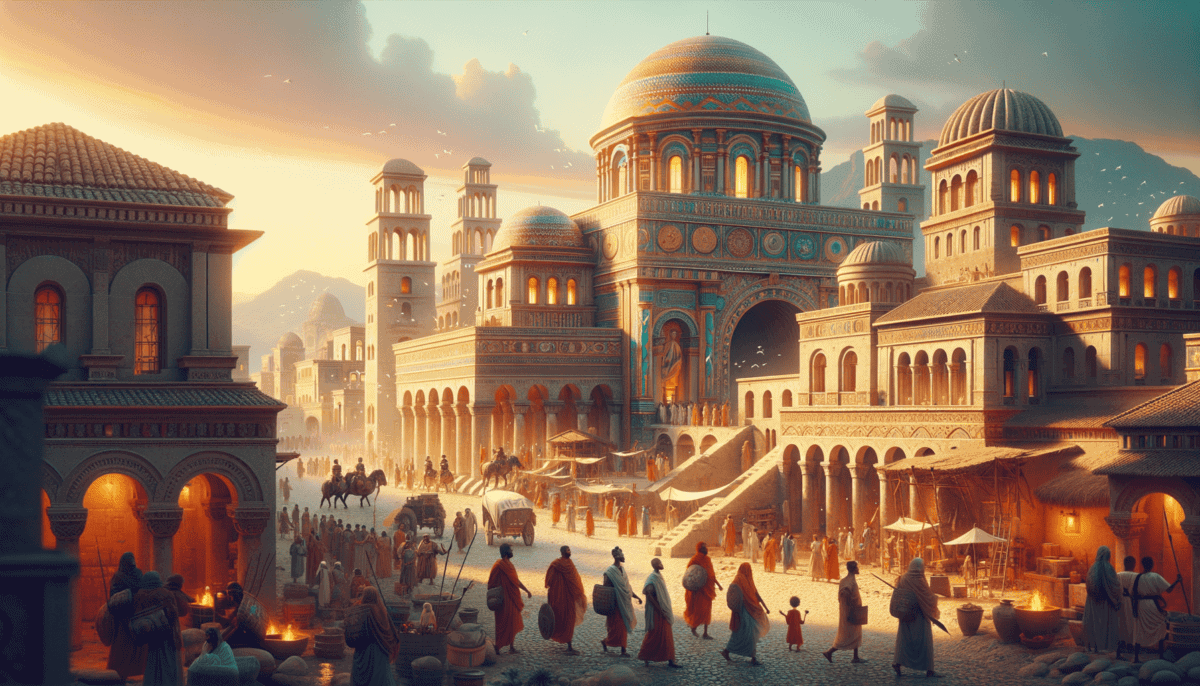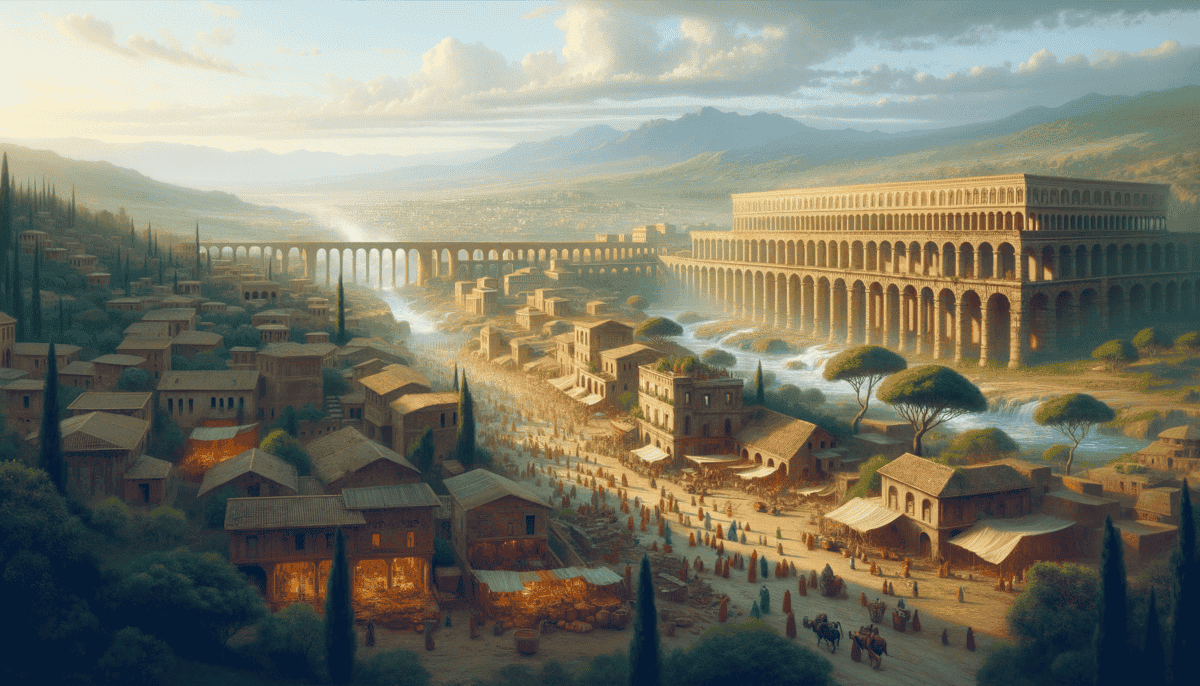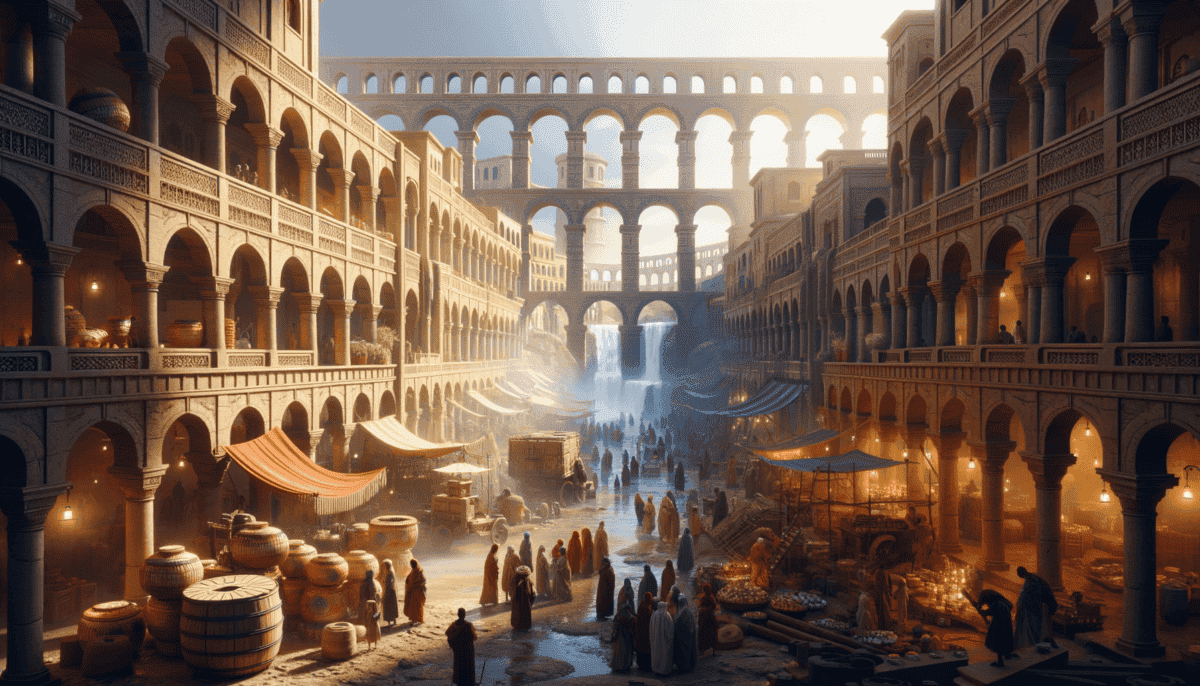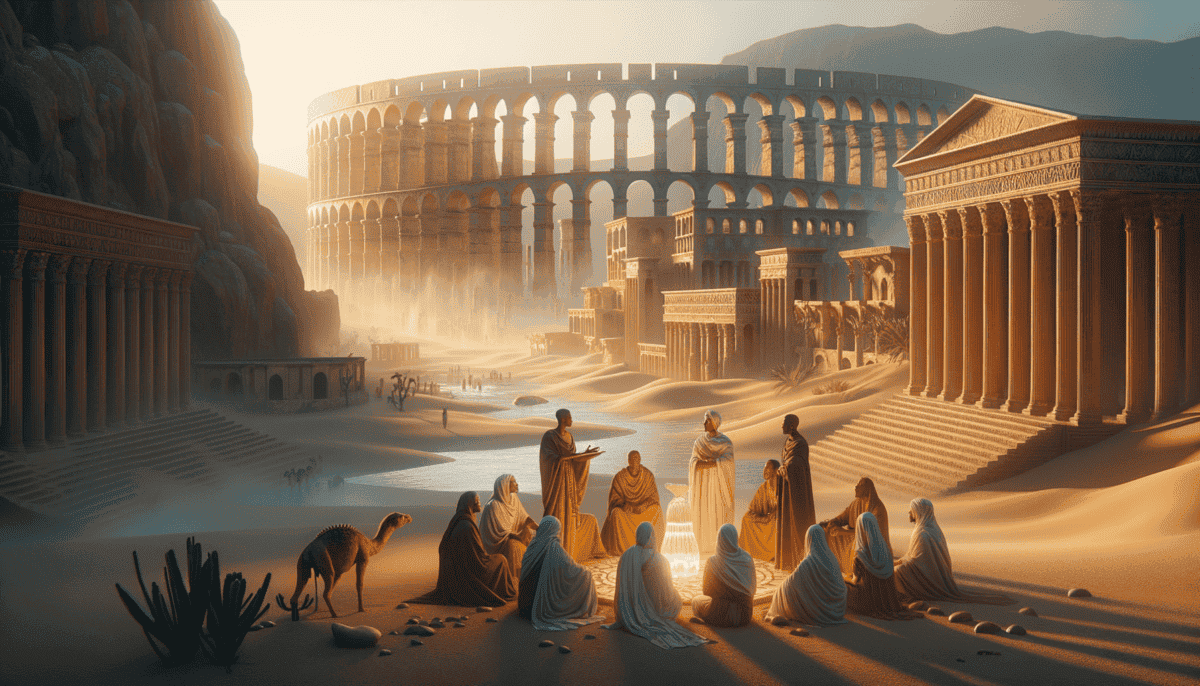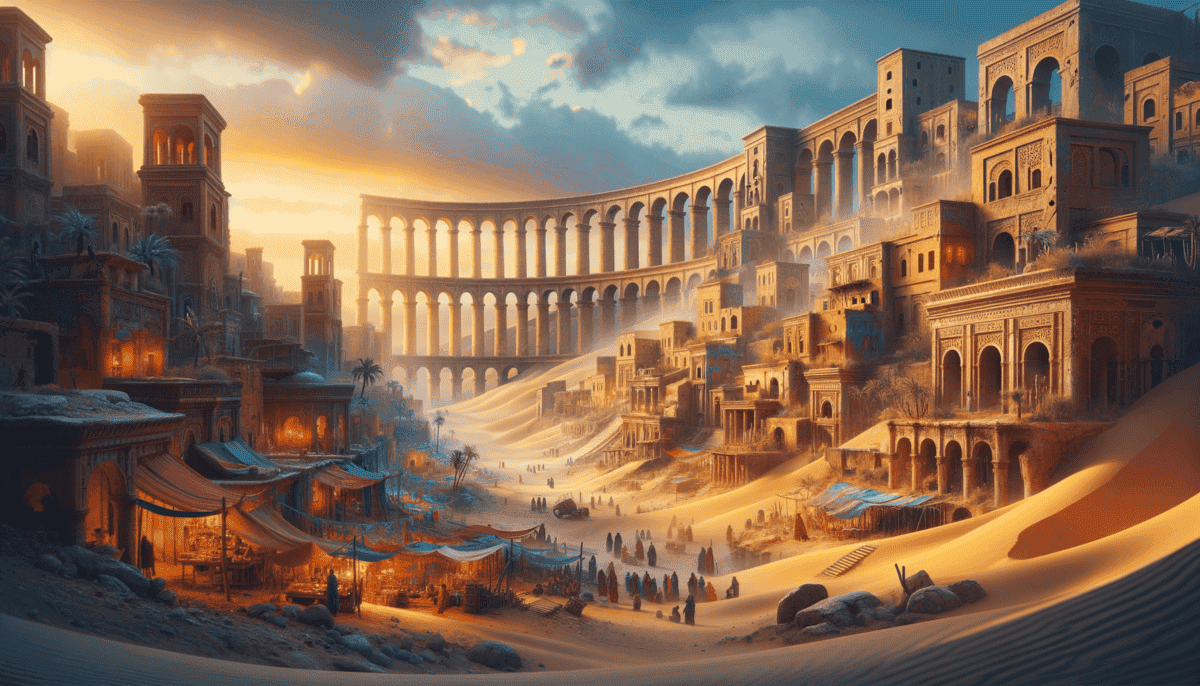The Fallen City
Marcus stood at the edge of the marketplace in Carthage, his heart heavy as he watched Roman ships appear on the horizon. The salty sea breeze carried the scent of spices and fear through the busy streets. At just twelve years old, he helped his father sell beautiful purple fabrics to wealthy merchants.
"Father, why are there so many ships today?" Marcus asked, tugging at his father's sleeve.
"Those are Roman ships, my son. They've been coming more often lately." His father's voice was quiet and worried.
The great city of Carthage was beautiful. Tall buildings made of golden stone reached toward the sky. Gardens full of sweet-smelling flowers decorated the hills. In the harbor, hundreds of trading ships bobbed gently in the blue waters. ️
But things were changing. Roman soldiers walked the streets more often now. They wore shiny armor and red cloaks, carrying shields with the letters SPQR. Marcus didn't like how they looked at his city as if it already belonged to them.
"Tell me about the old days, Father," Marcus said as they packed up their goods for the day. "Before the Romans came."
His father smiled sadly. "Ah, those were grand times! Our ships sailed to every corner of the sea. We traded with people from far-away lands. Our markets were filled with gold, ivory, and precious stones."
That evening, as they walked home through the narrow streets, Marcus saw his friend Hannibal running toward them. Hannibal's face was red from running, and he was breathing hard.
"More Roman ships are coming!" Hannibal shouted. "My father says they're bringing soldiers!"
Marcus felt his stomach tighten. He knew what that meant. The Romans wanted Carthage for themselves. They didn't want to share the sea or the trade routes. They wanted everything.
The next few days were scary and confusing. More and more Roman ships filled the harbor. Soldiers marched through the streets. People whispered about war.
One morning, Marcus woke up to loud noises. He ran to the window and saw smoke rising from the harbor. The Romans were attacking!
"Quick, Marcus!" his father called. "We must go to the temple. It will be safe there."
As they hurried through the streets, Marcus saw things he would never forget. Brave Carthaginian soldiers fought against the Romans. People carried water to put out fires. Some cried as they left their homes behind.
At the temple, Marcus found Hannibal and his family. They huddled together and listened to the sounds of battle outside.
"Will our city survive?" Marcus whispered to his father.
His father pulled him close. "Carthage is strong, my son. We have survived many things. But now we must be brave and wise. Sometimes survival means learning to change."
Days passed. The fighting continued. Marcus watched from the temple as his beloved city changed forever. The Romans were winning, but they didn't destroy everything. They wanted Carthage's wealth, its harbors, and its position on the sea.
Slowly, life began to change. Roman builders started working alongside Carthaginian craftsmen. New buildings went up. Roman merchants joined the marketplace. Some things stayed the same, but many things were different.
Marcus and his father kept selling their purple fabric. Now they had new customers – Roman traders who paid good money for Carthaginian purple. Hannibal's family started learning Latin, the Roman language.
"Father," Marcus said one evening as they watched the sun set over the harbor, "are we Roman now?"
His father thought for a moment. "We are who we have always been, Marcus. But now we must learn to be something new too. Sometimes the bravest thing is to adapt and grow stronger in new ways."
Marcus looked out at the city he loved. It was changing, but it wasn't gone. In the streets below, he could hear people speaking both Punic and Latin. Roman soldiers walked past Carthaginian merchants. It wasn't the end – it was a new beginning.
As night fell over Carthage, Marcus realized that while his city had fallen to Rome, its spirit lived on in its people. They would find a way to keep their traditions alive while building something new with their conquerors. The story of Carthage wasn't over – it was just turning to a new page.
Conquest and Transformation
Five years had passed since the Romans took Carthage. Marcus, now seventeen, walked through streets that looked very different from his childhood memories. New stone buildings rose where old wooden ones once stood. The smell of Roman bread mixed with traditional Carthaginian spices in the air. ️
“Look at those columns, Marcus!” called out Hannibal, pointing to workers lifting huge marble pieces. “They’re building another Roman temple.”
Marcus watched as Roman engineers directed local workers. They used special tools to make sure everything was straight and level. It was amazing to see how they worked together, even though they spoke different languages.
“My father says we’re learning good things from them,” Hannibal said. “Like these new roads they’re building.”
The new Roman roads were special. They were straight and smooth, made with fitted stones. Carts didn’t bump and bounce on them like they used to. ️
Later that day, Marcus helped his father in their new shop. They still sold purple fabric, but now they had a proper Roman-style store with a big window facing the street. Roman customers liked to look at the goods before coming inside.
“Father,” Marcus said, “I’ve been thinking about learning Latin.”
His father smiled. “That’s wise, son. Many young people are learning it now. It helps with trade.”
The city was changing in other ways too. Roman soldiers weren't scary anymore – they helped keep peace in the streets. Some even married local girls and settled down in Carthage.
One morning, a Roman official named Claudius visited their shop. He spoke both Latin and Punic, which surprised Marcus.
“Your purple fabric is famous even in Rome,” Claudius said. “Would you like to sell it in other Roman cities?”
Marcus translated for his father, who nodded eagerly. This was a big opportunity!
That evening, Marcus went to the new public baths with Hannibal. It was something the Romans had brought to Carthage. The baths were like big swimming pools where people could clean up and talk with friends.
“It’s strange,” Hannibal said as they soaked in the warm water. “Five years ago, we were afraid of the Romans. Now we’re becoming more like them.”
“Not exactly like them,” Marcus replied. “We’re making something new. Look at the wall paintings – they show Roman gods next to our old Carthaginian stories.”
He was right. The city was becoming a mix of both cultures. People ate Roman bread with Carthaginian honey. They wore Roman-style clothes made from local purple fabric. Children played games from both cultures.
One day, Marcus saw something that made him stop and stare. A group of young people was playing music in the street. They used Roman instruments to play traditional Carthaginian songs. The sound was beautiful and new.
“You see?” his father said, coming to stand beside him. “This is how we survive. We take the best of both worlds and make something better.”
The Romans were building new things all over North Africa. They made long waterways called aqueducts to bring fresh water to cities. They built huge theaters where people could watch plays and listen to music. Farmers learned new ways to grow more food.
Marcus began teaching younger children to read and write in both languages. He found that many Roman children wanted to learn Punic too. They were curious about the old stories and traditions of Carthage.
“Maybe this is what Father meant,” Marcus thought. “Being brave and wise means finding ways to grow stronger together.”
As the sun set over the new Carthage, Marcus could see both Roman and Carthaginian ships in the harbor. The city was bigger now, busier than ever. It wasn’t the same city he remembered from his childhood, but it was alive and growing.
That night, he dreamed of what the future might bring. More cities would grow in Africa, mixing Roman ideas with local wisdom. New roads would connect them all, carrying traders and travelers across the land. The story of his people would continue, changed but not forgotten, as part of something bigger than before.
Building an African Roman World
The morning sun sparkled on the new aqueduct rising above Leptis Magna. Water flowed like a river in the sky, bringing fresh water to the growing city. Marcus stood with his friend Hannibal, watching the workers add more stone blocks.
“It’s amazing!” Hannibal said. “My grandfather says this city used to be so small. Now look at it!”
Marcus was now twenty, and working as a builder’s helper. He loved seeing how Roman engineers solved problems. When the hot African sun made workers tired, they built covered walkways for shade. When sand threatened to block roads, they planted special trees to hold it back.
“Come see what we finished yesterday!” Marcus led Hannibal to the new marketplace. The building had tall columns and a beautiful dome roof. Inside, shops sold goods from all over the empire.
A merchant called out in a mix of Latin and local words: “Fresh dates! Sweet as honey! Good price for you!”
The marketplace buzzed with activity. People wore clothes that mixed Roman and African styles. Some women wore bright African patterns with Roman-style pins. Men wore Roman togas made from local wool.
“Look there,” Hannibal pointed to a group of children playing. “They’re playing our old mancala game, but using Roman marble pieces!”
Marcus smiled. The city was becoming something special – not just Roman, not just African, but a wonderful mix of both. New buildings went up every day:
- A grand theater for plays and music
- Public baths with hot and cold pools ♂️
- Temples that honored both Roman and African gods ⛪
- Schools where children learned in Latin and local languages
- Beautiful homes with gardens and fountains
Later that day, Marcus visited his old friend Claudius, who was now a city leader. They sat in a courtyard where African plants grew around a Roman-style fountain.
“The emperor is very pleased with our city,” Claudius said. “He says we’re showing how Romans and Africans can build great things together.”
Marcus thought about how much had changed. Ten years ago, many people were scared of the Romans. Now, their cities were growing bigger and better than ever. Ships came from everywhere to trade:
Traders brought silk from far-away China. Others carried spices from Arabia. African ivory and gold went to Rome. The ports were always busy with boats coming and going.
That evening, Marcus walked through the new public gardens. Fountains splashed coolly in the heat. Children played on smooth stone paths. Old men played board games under palm trees.
“Marcus! Come join us!” called his friend Lucia. She was teaching a group of children to write in both Latin and the local language.
He sat down with them, helping a small boy form letters in the sand. The boy’s father watched proudly.
“My son will know both worlds,” the father said. “He will be stronger for it.”
As night fell, Marcus climbed the hill above the city. Leptis Magna glowed with oil lamps. The new buildings shone white in the moonlight. Far away, he could see the aqueduct stretching like a giant bridge across the land.
A warm breeze carried the smell of evening meals – Roman bread baking, African spices cooking. Music drifted up from the city – drums and flutes playing together in new ways.
Tomorrow would bring more building, more mixing of old and new. Marcus couldn’t wait to see what they would create next. The African Roman world was growing, and everyone had a part in making it beautiful.
Life in the Roman African Provinces
The sun was setting over Leptis Magna as Amina hurried through the bustling streets. She carried a basket of fresh bread from her family’s bakery, where they mixed Roman recipes with African spices. The smell made her mouth water.
“Hurry, Amina!” called her little brother Tarik. “The show is about to start at the amphitheater!”
The huge amphitheater could hold thousands of people. Tonight, dancers would perform both Roman and African dances. Amina loved these shows where different traditions came together.
Inside, the seats were filling up. Rich people sat on cushions near the front. They wore fine clothes made of silk from far away. Other people sat higher up, but everyone could see well.
“Look at their costumes!” Tarik pointed as the dancers came out. Some wore Roman-style tunics, others had bright African patterns.
The music started – Roman flutes played with African drums. The dancers told stories about both cultures. The crowd clapped and cheered.
After the show, Amina and Tarik walked home through the city. Life here was different from both old Roman and African cities. New things they saw every day:
- Schools teaching both Latin and African languages
- Markets selling foods from all over the empire
- People wearing mixed styles of clothes
- Houses built to stay cool in the desert heat
- Games and sports from both cultures
At home, their mother was cooking dinner in their courtyard kitchen. The house was built in the Roman style, but with thick walls to keep out the desert heat. Plants grew around a small fountain, making the air feel cool.
“Tell me about the show,” their father asked as they ate. He was a teacher at the local school, where children learned to read and write in different languages.
The next morning, Amina went with her friend Julia to the public baths. This was where people came to get clean and meet friends. The building had pools of hot and cold water, and rooms filled with steam. ♀️
“My mother says when she was little, there were no baths like this,” Julia said. “Now everyone comes here – it’s like a party every day!”
Women chatted in different languages while getting massages. Children splashed in the cool pool. Old ladies gossiped in the steam room.
Later, they walked to the temple district. Some temples were for Roman gods, others for African ones. Many people visited both. ️
“The gods don’t mind sharing,” Julia’s grandmother always said. “They’re happy when people are happy.”
In the afternoon, Amina helped at the bakery. A trader from Egypt bought bread. He told stories about his travels while she wrapped his loaves.
When evening came, neighbors gathered in the street. Children played games with stones and balls. Adults talked about city news. Someone started playing music.
Amina watched Tarik play with his friends. Some had Roman names, some African names. They all played together, speaking a mix of languages. To them, this was normal.
The stars came out over the city. Oil lamps glowed in windows. The desert wind blew softly through palm trees.
Tomorrow would bring another busy day. There would be more shows to watch, bread to bake, friends to meet. Life in their Roman African city was always interesting, always changing, always making something new.
Rising Storms
Dark clouds gathered over Leptis Magna. Amina watched from her family’s bakery as people hurried through the streets. Something felt different today. ️
“Did you hear?” whispered Julia, rushing into the bakery. “The new tax collector is demanding double from everyone!”
Amina’s father frowned as he kneaded bread. “Many families can’t pay that much. The harvest wasn’t good this year.”
Outside, a crowd gathered in the marketplace. An old man stood on a box, speaking in their local language. “Why should we give more to Rome? This is our land!”
Some people cheered. Others looked worried. A Roman guard walked by, and everyone got quiet.
“Times are changing,” Amina’s mother said softly. “People are angry about the new rules.”
That afternoon, Amina saw her teacher Lucius arguing with the tax collector. Lucius was born in Africa but trained in Rome. Usually calm, today his face was red with anger.
“These people work hard! You can’t take everything they have!” Lucius shouted.
The tax collector just smiled. “Orders from Rome. Pay or face the consequences.”
At the public baths, instead of happy chatter, Amina heard worried whispers:
- Farmers couldn’t afford seeds for next season
- Shop owners were closing their stores
- Young men were talking about fighting back ⚔️
- Some families were leaving the city ♀️
- Food prices were getting too high
“Remember when we all got along?” sighed Julia’s grandmother. “Now everyone’s choosing sides.”
That evening, a group of young people marched through the streets. They sang old African songs and carried signs in their local language. Some Romans watched with angry faces.
Tarik came running home excited. “The marble workers said they won’t build any more Roman temples until things change!”
Their father pulled him inside quickly. “Be careful what you say, son. These are dangerous times.”
At night, Amina heard shouting in the street. Someone had painted messages on the walls of Roman buildings. The guards were looking for who did it.
The next day, Julia didn’t come to the bakery. Her family had decided to move back to Rome. Many Roman families were leaving.
“But this is your home too!” Amina cried when she said goodbye to her friend.
“Not anymore,” Julia said sadly. “Everything’s different now.”
More changes came quickly. The amphitheater stopped mixing Roman and African shows. Markets divided into separate sections. Even the public baths had different hours for Romans and Africans.
One morning, Amina found Lucius packing his scrolls. “I tried to speak for both sides,” he said. “But no one wants to listen anymore.”
That night, fires burned in the hills outside the city. People said rebels were gathering there. The Roman guards doubled their patrols.
Amina’s mother looked at the flames with sad eyes. “We built something beautiful here,” she said. “Why can’t people remember that?”
But each day brought new troubles. The peaceful mix of cultures they had known was falling apart, piece by piece.
In the dying light, Amina watched smoke rise over her beloved city. The future looked as dark as the gathering storm clouds. She wondered if the peace they had known would ever return.
Echoes Across Time
The sun rose over the ruins of Leptis Magna. Five years had passed since the troubles began. Amina, now older, walked through the changing city.
“Look, Amina!” called her little brother Tarik. “The old fountain works again!” Water splashed in the marketplace where local craftsmen had fixed the Roman pipes.
Things had changed in unexpected ways. After the big fights, Rome’s power grew weaker. But the cities didn’t fall apart like some feared. Instead, something new emerged.
“We found our own way,” Amina’s father said proudly, showing her the new bread he baked. It used Roman wheat but African spices.
The marketplace buzzed with activity. Now African and Roman shops sat side by side again. But this time, the rules came from local leaders who understood both worlds.
Amina taught at the school now, sharing stories of both cultures:
- Roman roads still connected cities ️
- African farming methods saved water
- Local art decorated Roman buildings
- People spoke many languages
- New foods mixed old recipes
“Remember when Julia left?” Tarik asked. Amina nodded, touching the letter in her pocket. Her friend wrote from Rome, saying some families were coming back.
The old teacher Lucius had returned too. “This place is special,” he said. “It’s not just Roman or African anymore. It’s something better.”
In the evening, Amina walked to the hills where rebels once camped. Now children played there, singing songs in Latin and African languages. The sunset painted the old Roman walls with African colors.
At home, her mother cooked in their old clay oven, but used Roman recipes. “We keep what works,” she smiled. “That’s how we grow stronger.”
Young artists carved new stories on temple walls, mixing Roman and African styles. Engineers combined Roman arches with African cooling systems. Farmers shared secrets from both cultures.
Even the public baths changed. “Now we talk about both histories,” an old storyteller said. “Each one makes the other better.”
Amina sat with her students under an ancient olive tree. “Our city shows how different people can live together,” she told them. “It wasn’t always easy, but we found a way.”
As stars appeared over the desert, she thought about all the changes. The Roman Empire would fade, but its cities in Africa left something special behind – proof that cultures could mix and make something new and beautiful. ⭐
That night, Amina wrote in her diary about her hopes. Maybe someday, people would look at their cities and learn how to blend the best of different worlds. The story of Roman Africa wasn’t over – it lived on in every new generation that chose to build bridges instead of walls.
In the quiet evening, lamp lights twinkled across the city like earthbound stars. Each one marked a home where African and Roman traditions now danced together in harmony, lighting the way forward for all who would follow.

